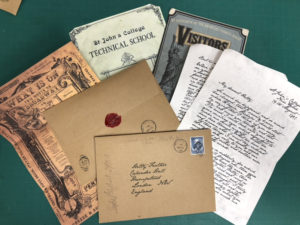This section affords the opportunity for philatelic sharing of any kind. This is where you can be creative and pull from your favorite non-traditional topics – the lighter side. The contents remain the property of the author. Contact Dr. Charles J. DiComo to share.
In September 2018, Charles J. DiComo, PhD was contacted by Leonie Tucker, a graphic designer in the United Kingdom, looking for assistance with a project. She wanted to be historically accurate in her prop design for a television drama she was working on called “Hetty Feather.”
Her email read: Dear sir, I wonder if you could help me. I’m working on an English children’s drama called “Hetty Feather” which is set in the summer of 1890. I have to create a period envelope that Hetty’s friend from New York has sent her. My question is, do you have any reference images of what the stamps used to send such a letter from America to England, would look like? Would it be any old envelope or a specific one for posting over seas? Leonie

Charles sent her examples from his collection of stamped envelopes with letters being sent from New York to London in the 1890’s, along with representative stamps, rates, etc. Above is the product of Leonie’s work – very accurate – she even incorporated a red wax seal along with other ephemera. We are very pleased to have assisted in ensuring philatelic and historic accuracy.
with kind permission of Dr. Charles J. DiComo, ©2018
The presentation that follows is a story of Banking in the Village of Pawling, located in Dutchess County, New York – as told through postal history, postal cards, postal stationery, bank checks, promissory notes, bank tags, post cards, and currency (fractional and federal) from 1849 to 1929. Enjoy!
with kind permission of Robert Bramwell, ©2015
The 16 pages that follow are the story of 200 years of procedural change meant to reduce the revenue loss and processing cost incurred by the American postal system for unclaimed mail and “dead” letters. Enjoy!

